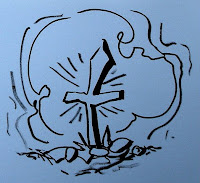
After a warm welcome and announcements, Darlene opened the service today with a beautiful medley, weaving together “As the Hart” and “Fairest Lord Jesus.” It was a quite moving introduction to our worship time.
Today’s sermon was a continuation of the messages we have been hearing based on the letters to the seven churches, from Revelations chapters 2 and 3. This morning’s message was drawn from Rev. 3:1-6, the letter to the church at
Sardis.
1"To the angel of the church in Sardis write: These are the words of him who holds the seven spirits of God and the seven stars. I know your deeds; you have a reputation of being alive, but you are dead. 2 Wake up! Strengthen what remains and is about to die, for I have not found your deeds complete in the sight of my God. 3 Remember, therefore, what you have received and heard; obey it, and repent. But if you do not wake up, I will come like a thief, and you will not know at what time I will come to you. 4 Yet you have a few people in Sardis who have not soiled their clothes. They will walk with me, dressed in white, for they are worthy. 5 He who overcomes will, like them, be dressed in white. I will never blot out his name from the book of life, but will acknowledge his name before my Father and his angels. 6 He who has an ear, let him hear what the Spirit says to the churches.
Pastor Brad opened with comments about one of the number one TV shows today,
CSI, which stands for “Crime Scene Investigation.” This popular show has expanded to include
CSI Miami,
CSI New York and
CSI Las Vegas. Brad jokingly noted that the show’s popularity is such that we may even have a
CSI Twig one day.
The show always begins with a death. Then it’s the job of the
CSI team to do an autopsy and find the real cause of the death.
Then Pastor Brad turned the tables toward the direction of his message. “At one time in my life I was on a Crime Scene Investigation,” he said. “Only is was a Church Scene Investigation.” Instead of a murder victim, there was a dead church body. “One of the saddest things in the world is to see a church dying,” he explained, a fitting intro to his exposition on the letter to the church at
Sardis.
“I know your deeds; you have a reputation of being alive, but you are dead.” (vs 1)
Sardis had been a wealthy city. It had been a cultural trendsetter. This was a city which had been formerly filled with splendor, a city of wealth and luxurious living, something akin to another TV show, “Lifestyles of the Rich and Famous.”
The church of
Sardis, too, had initially been a beacon of light. It had been a vibrant witness for Christ, making a difference. In the past this church had been a trauma center for wounded people and a lighthouse for the lost. But no more.
In this brief letter to the church at
Sardis there are no words of commendation. Where it really counted, this church was dead.
Interestingly enough, unlike the troubles at some of the other churches, the downfall was not due to false prophets, persecutions, pressures from outside. The problem was from within.
Referring back to his own life lessons, Brad stated, “I learned that if a church is not being continuously renewed, it will die.” He said he labored hard to make the church relevant. He had a great vision for the church, but its methods were old fashioned and ineffective.
It is an interesting oxymoron: Dead Church. Because Jesus once said, “I will build My church, and the gates of hell shall not prevail against it.”
In point of fact, the Church, the body of Christ, has prevailed through the ages. But individual churches can, and do, die. Currently, in this country, 2700 churches a year close their doors, permanently.
Brad’s passion for New Life Covenant is that we be continuously renewed, for we can die, too.
Typically, historically, churches expand and decline over a course of thirty years. He said that when he arrived at the church he has been referring to, it had been dying for five years.
To the church at
Sardis Jesus says, “Wake up… Strengthen what remains.”
Brad aimed to make five points based on this passage.
1) Wake up.
Death in the future comes by living in the past. The church at
Sardis had become self-centered and apathetic by resting on its laurels, self-satisfied based on its previous reputation. This letter is a wake up call, a call to spiritual vigilance.
Something is at stake. Living in the past makes it impossible to move forward. We cannot glamorize the past.
Brad noted that learning from the past is different from living in the past. “I’m proud, thankful, to be in a place where people matter more than whether a pastor wears a tie or not,” he said.
This was a lead in to another church killer, being inflexible.
2) Strengthen what remains.
A church needs to hold fast to its core values. Being flexible does not mean letting go of unchangeable truths or realities. Some things should never change.
Hebrews 13:8 states, “Jesus is the same yesterday, today and forever.”
In the culmination of the Sermon on the Mount Jesus says that our lives must be founded on a rock, on the unchanging truths, God’s word. The Bible is an unshakable, immovable rock.
And in Luke 21:33 Jesus declared, “Heaven and earth will pass away, but my words will never pass away.”
On the other hand, we need to be flexible in our methods. Living churches evaluate their methods in an effort to stay relevant. Because one of the most dangerous things that a church can do is fall in love with its methods instead of being in love with the lost people those methods are used to reach.
3) Remember what God alone can do.
The only way to be continuously dynamic is to rely on the power of the Holy Spirit. Remember, there is a supernatural piece to church growth.
4) Hold on.
Hold on the primary mission. Hold on to the core value: people are what matters to God. Lost people matter to God.
5) Repent.
Jesus says this with urgency.
At this point it was evident Pastor Brad had much more to say than his heart could contain. With passion he exhorted us in a flood of heartfelt words that this scribe was unable to record. Lost people matter. God wants to us to stay vibrant, to be concerned about the things Jesus is concerned about.
Jesus says whoever has ears to hear, let him hear what the spirit says to the churches.
With this, stepping to the communion table our pastor said, “Communion is our sacred privilege…”
Gwen then offered up a beautiful song to usher us into the celebration of the sacrament of the Lord’s Supper.
 In 2007, Brooke Shannon and an array of energetic volunteers created an exciting new ministry at New Life Covenant called Adventure Club. Adventure Club is a children’s program that meets at the church on Wednesday evening, focused on kids age 4 through 6th grade.
In 2007, Brooke Shannon and an array of energetic volunteers created an exciting new ministry at New Life Covenant called Adventure Club. Adventure Club is a children’s program that meets at the church on Wednesday evening, focused on kids age 4 through 6th grade. To date, the program this fall has been averaging 26 kids a week, and owes much to the 20 or so volunteers whose dedication makes the program possible.
To date, the program this fall has been averaging 26 kids a week, and owes much to the 20 or so volunteers whose dedication makes the program possible. At the end of her brief update Brooke shared how last week there was a special moment that showed how the Adventure Club was indeed helping to imprint Bible truths inside the kids' hearts. Her small group was gathered and it was time for them to do their memory verse. Before we began, one of the girls rattled off a verse. I said it was last week’s verse and she said, “It’s been stuck in my head all week.”
At the end of her brief update Brooke shared how last week there was a special moment that showed how the Adventure Club was indeed helping to imprint Bible truths inside the kids' hearts. Her small group was gathered and it was time for them to do their memory verse. Before we began, one of the girls rattled off a verse. I said it was last week’s verse and she said, “It’s been stuck in my head all week.”








